名词性从句用法详解
名词性从句讲解(最全版)
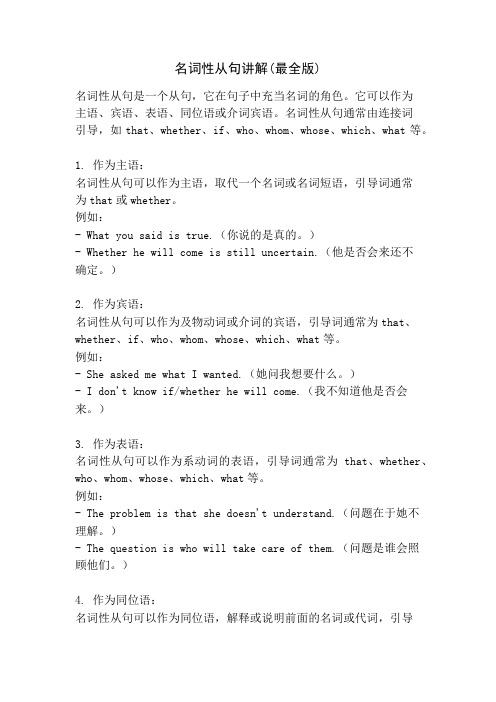
名词性从句讲解(最全版)名词性从句是一个从句,它在句子中充当名词的角色。
它可以作为主语、宾语、表语、同位语或介词宾语。
名词性从句通常由连接词引导,如that、whether、if、who、whom、whose、which、what等。
1. 作为主语:名词性从句可以作为主语,取代一个名词或名词短语,引导词通常为that或whether。
例如:- What you said is true.(你说的是真的。
)- Whether he will come is still uncertain.(他是否会来还不确定。
)2. 作为宾语:名词性从句可以作为及物动词或介词的宾语,引导词通常为that、whether、if、who、whom、whose、which、what等。
例如:- She asked me what I wanted.(她问我想要什么。
)- I don't know if/whether he will come.(我不知道他是否会来。
)3. 作为表语:名词性从句可以作为系动词的表语,引导词通常为that、whether、who、whom、whose、which、what等。
例如:- The problem is that she doesn't understand.(问题在于她不理解。
)- The question is who will take care of them.(问题是谁会照顾他们。
)4. 作为同位语:名词性从句可以作为同位语,解释或说明前面的名词或代词,引导词通常为that、whether、who、whom、whose、which、what等。
例如:- The fact that he lied surprised me.(他撒谎的事实让我感到惊讶。
)- His belief that she will succeed is unwavering.(他坚信她会成功。
名词性从句的用法

名词性从句的用法名词性从句是在句子中充当名词的成分的从句。
名词性从句可以作为主语、宾语、表语或补语,常见的名词性从句有宾语从句、主语从句、表语从句和同位语从句。
1. 宾语从句(Object Clause):宾语从句在主句中充当宾语的角色。
一般引导宾语从句的词包括that, whether, if, why, how, when, where, who, whom 等。
示例:I don't know where he lives.(我不知道他住在哪里。
)2. 主语从句(Subject Clause):主语从句在句子中充当主语的角色。
常用的引导词有that, whether, if, what, who, which, where, how 等。
示例:What she said surprised me.(她说的话让我很惊讶。
)3. 表语从句(Predicate Nominative Clause):表语从句在句子中充当表语的角色。
一般由连词that 或whether 引导,也可以由who, whom, whose, which 等引导。
示例:His dream is that he can become a famous singer.(他的梦想是成为一名著名的歌手。
)4. 同位语从句(Appositive Clause):同位语从句用来解释、说明和限制先行词的意义。
它与先行词之间往往用连词that 或whether 连接。
示例:The news that he had won the prize made everyone happy.(他获奖的消息让大家都很高兴。
)。
名词性从句的用法和特殊引导词和名词性从句在句子中的位置和作用

名词性从句的用法和特殊引导词和名词性从句在句子中的位置和作用名词性从句的用法和特殊引导词以及名词性从句在句子中的位置和作用名词性从句是指在句子中充当名词的从句。
它可以作主语、宾语、表语、同位语等,在英语中被广泛应用。
本文将介绍名词性从句的用法以及特殊引导词,并探讨名词性从句在句子中的位置和作用。
一、名词性从句的用法名词性从句可以用来代替句子中的名词,并在句中担任特定的语法角色。
主要有以下几种用法:1. 主语从句:名词性从句作主语,位于主句的动词之前,如:- What you said is true.(你说的是真的。
)- Whether she will come is still unknown.(她是否会来仍然是未知的。
)2. 宾语从句:名词性从句作及物动词或介词后的宾语,如:- I don't know what to do.(我不知道该怎么办。
)- They asked me where I was going.(他们问我要去哪里。
)3. 表语从句:名词性从句作连系动词后的表语,如:- The most important thing is that you are safe.(最重要的是你平安。
)- My wish is that everyone can live a happy life.(我的愿望是每个人都能过上快乐的生活。
)4. 同位语从句:名词性从句作另一个名词的同位语,如:- The fact that he made a mistake surprised everyone.(他犯了一个错误这个事实令人惊讶。
)- Her belief that honesty is the best policy is well-known.(她认为诚实是最好的策略,这一观点很有名。
)二、特殊引导词名词性从句有一些特殊的引导词,根据从句的不同用法选择相应的引导词。
以下是常见的特殊引导词:1. 作主语从句的引导词:- that: He said that he would come.(他说他会来。
名词性从句解析
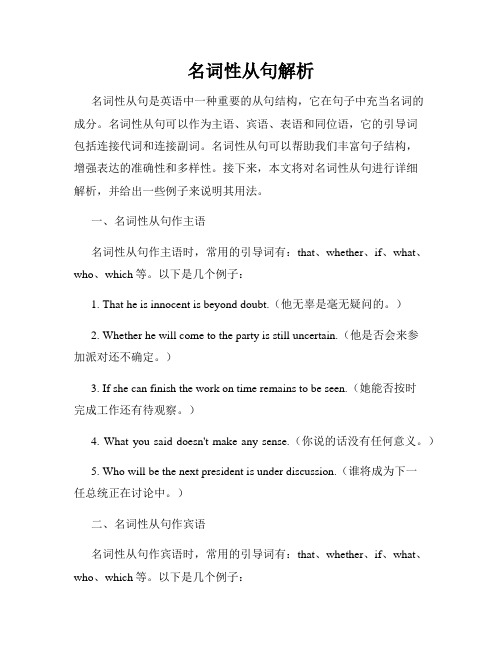
名词性从句解析名词性从句是英语中一种重要的从句结构,它在句子中充当名词的成分。
名词性从句可以作为主语、宾语、表语和同位语,它的引导词包括连接代词和连接副词。
名词性从句可以帮助我们丰富句子结构,增强表达的准确性和多样性。
接下来,本文将对名词性从句进行详细解析,并给出一些例子来说明其用法。
一、名词性从句作主语名词性从句作主语时,常用的引导词有:that、whether、if、what、who、which等。
以下是几个例子:1. That he is innocent is beyond doubt.(他无辜是毫无疑问的。
)2. Whether he will come to the party is still uncertain.(他是否会来参加派对还不确定。
)3. If she can finish the work on time remains to be seen.(她能否按时完成工作还有待观察。
)4. What you said doesn't make any sense.(你说的话没有任何意义。
)5. Who will be the next president is under discussion.(谁将成为下一任总统正在讨论中。
)二、名词性从句作宾语名词性从句作宾语时,常用的引导词有:that、whether、if、what、who、which等。
以下是几个例子:1. He knows that I am telling the truth.(他知道我说的是真话。
)2. I'm not sure whether it will rain tomorrow.(我不确定明天是否会下雨。
)3. I wonder if he has received my email.(我想知道他是否收到了我的电子邮件。
)4. Please tell me what you want for dinner.(请告诉我你想要吃什么晚餐。
名词性从句用法详解

I think it is because you are doing too much.我想这是因为你做得太多。
连接代词
what
which
who
whom
whose
什么
哪一
谁
谁
谁的
主语
表语
宾语
定语
宾补
The problem is who we can get to replace her.问题是我们能找到谁去替换她呢。
It’s a pity that we can’t go.很遗憾我们不能去。
It’s no surprise that our team should have won the game.我们没赢这场比赛真意外。
3)It+be+过去分词(said, reported, thought, expected, decided, announced, arranged, etc.)+that从句。
whoever
whatever
whichever
无论谁
无论什么
无论哪一
主语
表语
宾语
定语
宾补
She will give whoever needs help a warm support.凡需要帮助的人,她都会给予热情的支持。
Eat whichever one you like and leave the others for whoever comes in late.喜欢吃哪一个就吃哪一个,把其余的留给进来迟的。
How this happened is not clear to anyone.这事怎样发生的,谁也不清楚。
英语名词性从句讲解【完整版】

2、I asked him if he could do me a favor .
If与whether的区别:
1、If不能引导放于句首的主语从句,而whether可以。 2、引导表语从句用whether,不用if。 3、引导同位语从句用whether,不用if。 4、whether可以引导从句作介词的宾语,不用if 。 5、whether or not 连在一起可以,但if不可以。而 “whether-----or not = if -----or not”
同位语从句:
定义:在复合句中充当同位语的句子。 同位语从句用来对其前面的抽象名词进行解释说明,被解释说明的词和 同位语在逻辑上是主表关系。 同位语常见名词:fact, suggestion, advice, idea, decision, news, thought, hope, belief, truth, doubt, promise, possibility, truth, warning, message, reason, report, question,explanation, wish, problem等。 常见的连接词:that, whether, what, who, how, when, where等。 用法: The thought that I want to buy my mother a birthday gift makes me excited.that 引导的同位语从句,解释说明 thought,从句不缺成 分 There is some doubt whether he will come. whether 引导同位语从句,if 不能引导同位语从句 we haven’t made the decision where we are going to spend our vacation. 有时同位语从句可以不紧跟解释说明的名词后面。 The news is surprising that he won the match.
名词性从句的用法解析

名词性从句的用法解析名词性从句是英语语法中的一种特殊结构,它在句子中扮演名词的角色。
名词性从句可以作主语、宾语、表语和补语,它的引导词通常包括“that”、“whether/if”、“wh-”疑问词以及“whoever”、“whatever”、“whichever”等。
1. 名词性从句作主语名词性从句可以作整个句子的主语,常见的引导词是“that”和“whether/if”:例句1:That he is late again is a disappointment to me.例句2:Whether/if she will attend the meeting is still uncertain.2. 名词性从句作宾语名词性从句可以作及物动词或介词的宾语,常见的引导词有“that”、“whether/if”以及wh-疑问词:例句1:He doesn't know whether/if he should accept the job offer.例句2:I doubt that they will arrive on time.例句3:She is worried about what will happen tomorrow.3. 名词性从句作表语名词性从句可以作句子中的表语,常见的引导词有“that”、“whether/if”以及wh-疑问词:例句1:His main concern is that he won't have enough time to finishthe project.例句2:The question is whether/if she can handle the responsibility.4. 名词性从句作补语名词性从句可以作某些动词的表语补语,通常以“that”引导:例句1:She considered it necessary that he should apologize.例句2:He made it clear that he didn't want to participate in the discussion.需要注意的是,在名词性从句中,有时候可以省略连词或引导词,尤其是在口语中。
完整版)名词性从句用法归纳
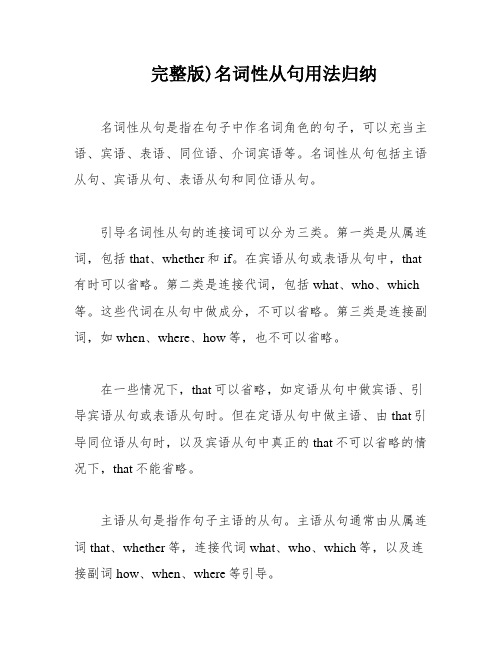
完整版)名词性从句用法归纳名词性从句是指在句子中作名词角色的句子,可以充当主语、宾语、表语、同位语、介词宾语等。
名词性从句包括主语从句、宾语从句、表语从句和同位语从句。
引导名词性从句的连接词可以分为三类。
第一类是从属连词,包括that、whether和if。
在宾语从句或表语从句中,that 有时可以省略。
第二类是连接代词,包括what、who、which 等。
这些代词在从句中做成分,不可以省略。
第三类是连接副词,如when、where、how等,也不可以省略。
在一些情况下,that可以省略,如定语从句中做宾语、引导宾语从句或表语从句时。
但在定语从句中做主语、由that引导同位语从句时,以及宾语从句中真正的that不可以省略的情况下,that不能省略。
主语从句是指作句子主语的从句。
主语从句通常由从属连词that、whether等,连接代词what、who、which等,以及连接副词how、when、where等引导。
2、连接词的使用:连接词在句子中起到连接的作用,其中that在句子中没有实际的意义,只是起到连接从句和主句的作用。
而连接代词和连接副词则在句子中既保留了自己的疑问含义,又起到连接从句和主句的作用,同时在从句中充当从句的成分。
例如,whom和who指人,what指物,而XXX和whoever则表示泛指意义。
举个例子,What he wants to tell us is not clear.表示他想告诉我们什么并不清楚。
另外,为了避免句子头重脚轻的情况,有时我们会用形式主语it代替主语从句,并将主语从句放在句末。
这种情况下,主语从句后的谓语动词一般使用单数形式。
常用的句型有:(1)It + be +名词+ that从句,如It is a fact that(事实是);(2)It + be +动词的过去分词+ that从句,如It is said that(据说);(3)It +不及物动词(vi)+ that从句,如It seems that (似乎);(4)It + be +形容词+ that从句,如It is naturalthat(很自然)。
名词性从句的语法解析

名词性从句的语法解析名词性从句是指在句中充当名词的成分的从句,可以作主语、宾语、表语、同位语等。
名词性从句的引导词有“从属连词”和“连接代词”两种。
一、主语从句主语从句在句中充当主语,常引导主语从句的连接词有“that”和“whether/if”。
其中,“that”在口语中常省略,而“whether/if”则一般用于句中有“or not”时。
例如:1. That he passed the exam is good news.(非正式:He passed the exam is good news.)2. Whether he will come to the party is still uncertain.(非正式:If he will come to the party is still uncertain.)二、宾语从句宾语从句在句中充当宾语,常引导宾语从句的连接词有“that”、“whether/if”、“what”和“who/whom”。
其中,“that”在口语中常省略。
例如:1. She said that she would go shopping later.(非正式:She said she would go shopping later.)2. I don't know whether/if he is coming to the party.(非正式:I don't know if he is coming to the party.)3. She asked me what I wanted for dinner.4. He asked who/whom I was talking to on the phone.三、表语从句表语从句在句中充当表语,常引导表语从句的连接词有“that”、“whether/if”和“what”。
例如:1. The important thing is that we are safe.(非正式:The important thing is we are safe.)2. The question is whether/if he will pass the exam.3. The problem is what we should do next.四、同位语从句同位语从句通常用来进一步解释说明某个名词或代词指代的内容,引导同位语从句的连接词有“that”、“whether/if”、“what”、“who/whom”等。
高中英语知识点归纳名词性从句的用法

高中英语知识点归纳名词性从句的用法名词性从句是英语中一个重要的语法结构,它可以在句子中充当名词的作用。
名词性从句可以作主语、宾语、表语和同位语等,它的引导词有很多种,比如that, whether, who, whom, whose, which, what, when, where等。
本文将对名词性从句的用法进行归纳总结。
1. 名词性从句作主语名词性从句作主语时,常用it代替整个从句,并将从句放在句子的后面。
例如:It is important that we learn English well.(我们学好英语很重要。
)2. 名词性从句作宾语名词性从句作宾语时,常与一些动词或介词搭配使用。
例如:I believe that he will come.(我相信他会来。
)She is not sure whether he likes her or not.(她不确定他是否喜欢她。
)They asked me what time the train would leave.(他们问我火车什么时候开。
)3. 名词性从句作表语名词性从句作表语时,常用it代替整个从句,并将从句放在句子的后面。
例如:The important thing is that we try our best.(重要的是我们尽力。
)4. 名词性从句作同位语名词性从句作同位语时,修饰前面的名词,起进一步说明或解释的作用。
例如:The fact that he lied surprised me.(他撒谎的事实使我吃惊。
)除了以上几种常见的使用方式,名词性从句还有一些特殊的用法。
5. 名词性从句与疑问词连用名词性从句与疑问词连用时,疑问词可以是关系代词或关系副词,例如:I don't know who will come.(我不知道谁会来。
)Please tell me where you were last night.(请告诉我你昨晚在哪里。
名词性从句的用法

名词性从句的用法名词性从句是从句的一种形式,可以在句中担任名词的角色。
在句子中,名词性从句可以充当主语、宾语、表语或补语。
掌握名词性从句的用法,对于提高文章的表达和理解能力非常重要。
本文将详细介绍名词性从句的不同用法及其相关例子。
一、名词性从句作主语1. 名词性从句作主语可以起到引出全文主题的作用。
例子:- What she said is absolutely right.(她说的是完全正确的。
)- Whether we should go camping this weekend remains undecided. (我们是否应该在这个周末去野营还没有决定。
)2. 名词性从句作主语可以代替一个复杂的句子。
例子:- How he managed to finish the project on time is still a mystery.(他如何在时间之内完成这个项目仍然是个谜。
)- What you do in your spare time is your own business.(你在业余时间做什么是你自己的事情。
)二、名词性从句作宾语1. 名词性从句作及物动词的宾语,说明动作的对象。
- I believe that love can change the world.(我相信爱可以改变世界。
)- She doesn't know where she left her keys.(她不知道她把钥匙放在哪里了。
)2. 名词性从句作介词的宾语,说明介词所表示的关系。
例子:- The teacher is proud of what his students have achieved.(老师为他的学生所取得的成绩感到骄傲。
)- I'm interested in how they managed to win the competition.(我对他们是如何赢得这个比赛感兴趣。
名词性从句用法详解
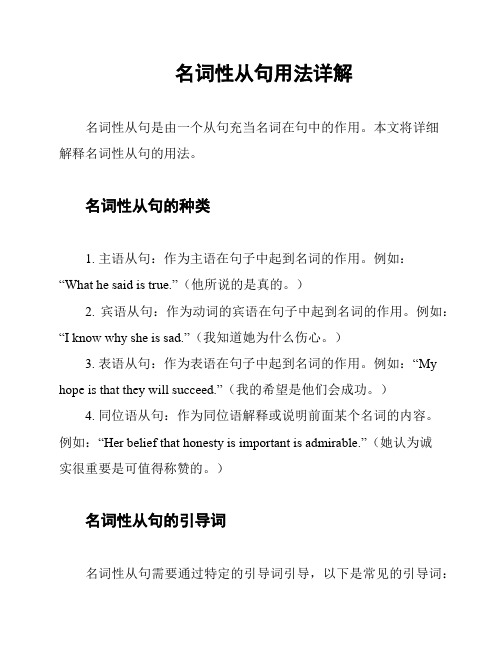
名词性从句用法详解名词性从句是由一个从句充当名词在句中的作用。
本文将详细解释名词性从句的用法。
名词性从句的种类1. 主语从句:作为主语在句子中起到名词的作用。
例如:“What he said is true.”(他所说的是真的。
)2. 宾语从句:作为动词的宾语在句子中起到名词的作用。
例如:“I know why she is sad.”(我知道她为什么伤心。
)3. 表语从句:作为表语在句子中起到名词的作用。
例如:“My hope is that they will succeed.”(我的希望是他们会成功。
)4. 同位语从句:作为同位语解释或说明前面某个名词的内容。
例如:“Her belief that honesty is important is admirable.”(她认为诚实很重要是可值得称赞的。
)名词性从句的引导词名词性从句需要通过特定的引导词引导,以下是常见的引导词:1. 主语从句引导词:that, whether, who, whom, whose, what, which, whoever, whomever, whichever, whatever(例如:I think that he is right.)2. 宾语从句引导词:that, whether, if, who, whom, whose, what, which(例如:I don't know what she wants.)名词性从句的用法注意事项1. 在主语从句中,当从句与主句的主语指代相同时,可以省略引导词that(例如:What he said is true.)2. 在宾语从句中,当从句的主语与主句的宾语指代相同时,可以省略引导词that和主语(例如:I know what she wants.)以上是对名词性从句用法的详细解释,希望对您有所帮助。
(字数:180)。
名词性从句的用法及句型变化

名词性从句的用法及句型变化名词性从句,顾名思义,就是在句中起名词作用的从句。
在句子中扮演名词的角色,可以作主语、宾语、表语、同位语等。
名词性从句的用法非常灵活,可以根据不同的语境和需要,以不同的句型来表达。
下面将详细介绍名词性从句的用法及句型变化。
一、名词性从句作主语名词性从句作主语时,常以"that"或"whether/if"引导。
其中"that"只起连接作用,无实际意义;而"whether/if"则表示选择或疑问。
例如:1. They know that he is a doctor.他们知道他是一名医生。
2. Whether/if he will come to the party is still unknown.他是否会来参加派对仍未知。
二、名词性从句作宾语名词性从句作宾语时,常以"that"引导,也可以使用连接代词或连接副词来引导。
例如:1. I believe that he is telling the truth.我相信他在说真话。
2. She doesn't know what to do next.她不知道下一步该做什么。
三、名词性从句作表语名词性从句作表语时,常以"that"引导,也可以使用连接代词或连接副词来引导。
例如:1. His wish is that all the children can receive education.他的愿望是所有孩子都能接受教育。
2. The most important thing is how you think about it.最重要的是你如何看待它。
四、名词性从句作同位语名词性从句作同位语时,常以"that"引导,用来解释或说明前面的名词。
例如:1. The news that he passed the exam made us all happy.他通过考试的消息让我们都很高兴。
名词性从句的用法
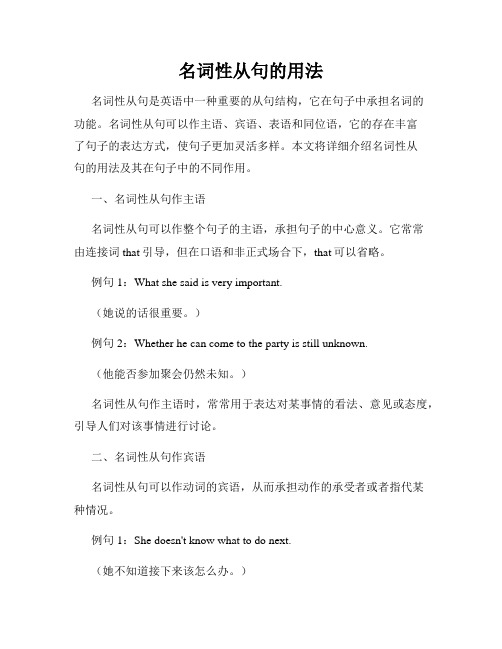
名词性从句的用法名词性从句是英语中一种重要的从句结构,它在句子中承担名词的功能。
名词性从句可以作主语、宾语、表语和同位语,它的存在丰富了句子的表达方式,使句子更加灵活多样。
本文将详细介绍名词性从句的用法及其在句子中的不同作用。
一、名词性从句作主语名词性从句可以作整个句子的主语,承担句子的中心意义。
它常常由连接词that引导,但在口语和非正式场合下,that可以省略。
例句1:What she said is very important.(她说的话很重要。
)例句2:Whether he can come to the party is still unknown.(他能否参加聚会仍然未知。
)名词性从句作主语时,常常用于表达对某事情的看法、意见或态度,引导人们对该事情进行讨论。
二、名词性从句作宾语名词性从句可以作动词的宾语,从而承担动作的承受者或者指代某种情况。
例句1:She doesn't know what to do next.(她不知道接下来该怎么办。
)例句2:I believe that you are telling the truth.(我相信你在说实话。
)名词性从句作宾语时,它紧跟在动词之后,用来回答“做什么”、“如何”、“为什么”等疑问词所提出的问题。
三、名词性从句作表语名词性从句可以作主语和表语之间的联系,表达主语的性质、状态、特征等。
例句1:His dream is that he can become a successful businessman.(他的梦想是能成为一名成功的商人。
)例句2:The problem is whether we should continue with the project.(问题在于我们是否应该继续这个项目。
)名词性从句作表语时,从句中的主语代替了主句的主语,连接词引导主从句的关系。
四、名词性从句作同位语名词性从句可以作名词的同位语,扩充对名词的解释或说明。
名词性从句讲解课件

特点
which在从句中担任成分 ,通常表示“哪个”、“ 哪些”。
例子
I don't know which book you like best. (我 用法
定义
例子
whose是一个限定词,用于引导名词 性从句,表示某个对象的所属关系。
I don't know whose book this is. ( 我不知道这是谁的书。)
分类
01
02
03
04
主语从句
在句子中充当主语的名词性从 句,通常放在句子的开头。
宾语从句
在句子中充当宾语的名词性从 句,通常放在动词或介词之后
。
表语从句
在句子中充当表语的名词性从 句,通常放在系动词之后。
同位语从句
在句子中充当同位语的名词性 从句,通常放在名词之后,对
名词进行补充说明。
02 名词性从句的引导词
总结词
在名词性从句中,从句与主句的逻辑关系经常处理不当。
详细描述
应仔细分析从句与主句之间的逻辑关系,确保从句的内容与 主句的内容相符合,避免出现逻辑上的矛盾或混乱。
感谢您的观看
THANKS
定义
why是一个副词,用于引导名词性从句,表示某 个原因或动机。
特点
why在从句中担任成分,通常表示“为什么”、 “因为什么”。
3
例子
I don't know why he left early. (我不知道他为 什么提前离开了。)
03 名词性从句的时态和语态
时态:现在时、过去时、将来时
现在时
表示现在或将来某个时间点发生的动作或存在的 状态。
强调句型
总结词
突出强调某个成分
名词性从句的用法与例句解析

名词性从句的用法与例句解析名词性从句是指在句子中作为名词使用的从句。
它可以充当主语、宾语、表语或同位语,起到连接主句与从句的作用。
名词性从句在英语中使用广泛,掌握好名词性从句的用法可以提高英语写作和口语表达的水平。
本文将介绍名词性从句的几种常见用法,并给出相应的例句解析。
一、名词性从句作主语名词性从句可以作为句子的主语,代替一个单词或一个名词短语。
常见的名词性从句作主语的句型有:1. It + be + 名词性从句例如:It is important that we protect the environment.(保护环境是重要的。
)解析:名词性从句“that we protect the environment”作为主语,其中“that”引导从句,描述了主观认识的重要性。
2. 名词性从句 + 动词例如:What he said is true.(他说的是真的。
)解析:名词性从句“What he said”作为主语,其中“What”引导从句,表示“他所说的”。
二、名词性从句作宾语名词性从句可以作为句子的宾语,接受动作的影响。
常见的名词性从句作宾语的句型有:1. 动词 + 名词性从句例如:I believe that he can succeed.(我相信他能够成功。
)解析:名词性从句“that he can succeed”作为宾语,其中“That”引导从句,表示对“他能够成功”这一事实的信任。
2. 名词 + 不定式 / 动名词 + 名词性从句例如:She has no idea what to do next.(她不知道接下来该做什么。
)解析:名词性从句“what to do next”作为宾语,其中“What”引导从句,表示对接下来该做什么的不确定性。
三、名词性从句作表语名词性从句可以作为句子的表语,说明主语的性质或状态。
常见的名词性从句作表语的句型有:1. 主语 + be + 名词性从句例如:The problem is that we don't have enough time.(问题在于我们没有足够的时间。
名词性从句的种类和用法
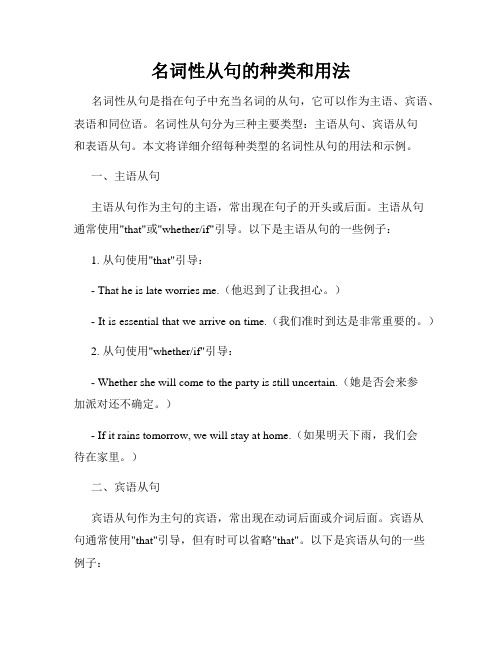
名词性从句的种类和用法名词性从句是指在句子中充当名词的从句,它可以作为主语、宾语、表语和同位语。
名词性从句分为三种主要类型:主语从句、宾语从句和表语从句。
本文将详细介绍每种类型的名词性从句的用法和示例。
一、主语从句主语从句作为主句的主语,常出现在句子的开头或后面。
主语从句通常使用"that"或"whether/if"引导。
以下是主语从句的一些例子:1. 从句使用"that"引导:- That he is late worries me.(他迟到了让我担心。
)- It is essential that we arrive on time.(我们准时到达是非常重要的。
)2. 从句使用"whether/if"引导:- Whether she will come to the party is still uncertain.(她是否会来参加派对还不确定。
)- If it rains tomorrow, we will stay at home.(如果明天下雨,我们会待在家里。
)二、宾语从句宾语从句作为主句的宾语,常出现在动词后面或介词后面。
宾语从句通常使用"that"引导,但有时可以省略"that"。
以下是宾语从句的一些例子:1. 从句使用"that"引导:- She told me that she loved me.(她告诉我她爱我。
)- They believe that he will win the competition.(他们相信他会赢得比赛。
)2. 从句省略"that":- He said he was busy.(他说他很忙。
)- I know you can do it.(我知道你能做到。
)三、表语从句表语从句用来描述主语或宾语的特征或状态,通常出现在系动词后面。
(完整版)名词性从句用法归纳
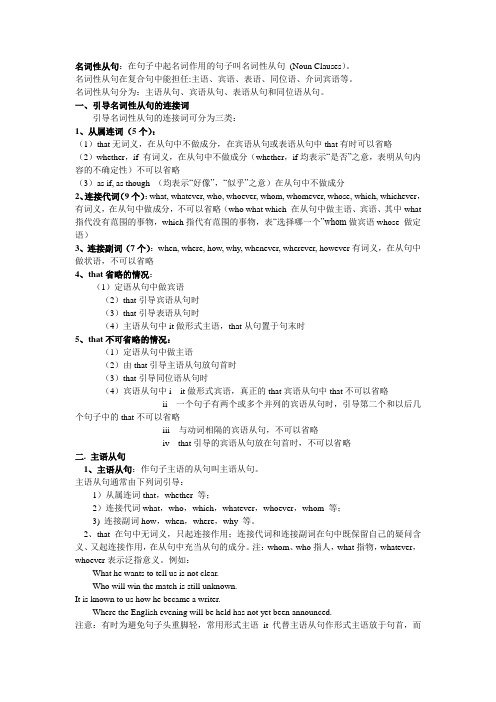
名词性从句:在句子中起名词作用的句子叫名词性从句(Noun Clauses)。
名词性从句在复合句中能担任:主语、宾语、表语、同位语、介词宾语等。
名词性从句分为:主语从句、宾语从句、表语从句和同位语从句。
一、引导名词性从句的连接词引导名词性从句的连接词可分为三类:1、从属连词(5个):(1)that无词义,在从句中不做成分,在宾语从句或表语从句中that有时可以省略(2)whether,if 有词义,在从句中不做成分(whether,if均表示“是否”之意,表明从句内容的不确定性)不可以省略(3)as if, as though (均表示“好像”,“似乎”之意)在从句中不做成分2、连接代词(9个):what, whatever, who, whoever, whom, whomever, whose, which, whichever,有词义,在从句中做成分,不可以省略(who what which 在从句中做主语、宾语、其中what 指代没有范围的事物,which指代有范围的事物,表“选择哪一个”whom做宾语whose 做定语)3、连接副词(7个):when, where, how, why, whenever, wherever, however有词义,在从句中做状语,不可以省略4、that省略的情况:(1)定语从句中做宾语(2)that引导宾语从句时(3)that引导表语从句时(4)主语从句中it做形式主语,that从句置于句末时5、that不可省略的情况:(1)定语从句中做主语(2)由that引导主语从句放句首时(3)that引导同位语从句时(4)宾语从句中i it做形式宾语,真正的that宾语从句中that不可以省略ii 一个句子有两个或多个并列的宾语从句时,引导第二个和以后几个句子中的that不可以省略iii 与动词相隔的宾语从句,不可以省略iv that引导的宾语从句放在句首时,不可以省略二. 主语从句1、主语从句:作句子主语的从句叫主语从句。
名词性从句用法详解

名词性从句用法详解一、概说名词性从句,即指性质相当于名词的从句,它包括主语从句、宾语从句、表语从句和同位语从句。
从高考的考查的实际情况来看,名词性从句考得最多的是宾语从句,其次是主语从句,再次是表语从句,而同位语从句则很少考查。
二、名词性从句的一般引导词1.连接词that 引导名词性从句时,只起连接作用,没有任何意思,也不充当句子成分,在宾语从句中可省略,但引导其他名词性从句时通常不省略。
如:I hope (that) you enjoy your holiday. 希望你假期过得好。
That he likes you is very obvious. 很显然他喜欢你。
2.连接词whether 引导名词性从句也不充当句子成分,但有自己的意思,表示“是否”;引导宾语从句时,可换成if,但引导其他名词性从句时不能换成if。
如(from www.yygram ):He asked whether [if] I would show him the way. 他问我是否可以给他带路。
Whether it will do us harm remains to be seen. 是否对我们有害还要看一看。
(引导主语从句,不能用if 代替whether)3.连接代词who(m), whose, which, what 等引导名词性从句时,均有各自的意义,在从句中作主语、宾语、定语等。
如:That’s why she wanted to leave. 这就是她想离开的原因。
When we arrive doesn't matter. 什么时候到没有关系。
Tell me which one you like best. 告诉我你最喜欢哪一个。
4.连接副词when, where, why, how 等引导名词性从句,也各自有自己的意义,在从句中作状语。
如:The question is how we should carry out the plan. 问题是怎样执行这个计划。
名词性从句的用法总结

名词性从句的用法总结名词性从句是指用来充当句子成分中的名词的从句。
本文将总结名词性从句的用法。
主语从句主语从句是名词性从句的一种,用来作为句子的主语。
主语从句一般由连词“that”或“是否”引导,例如:- That he is late is very annoying.(他迟到了非常令人烦恼。
)宾语从句宾语从句是名词性从句的一种,用来作为句子的宾语。
宾语从句一般由连词“that”“if”“whether”等引导,例如:- I wonder if she has received the parcel.(我不知道她是否收到了包裹。
)表语从句表语从句是名词性从句的一种,用来作为句子中的表语。
表语从句一般由连词“that”“whether”等引导,例如:- The fact that he failed the exam disappointed his parents.(他考试不及格的事实让他的父母失望。
)- Our concern is whether he can finish the task on time.(我们的担心是他是否能按时完成任务。
)同位语从句同位语从句是名词性从句的一种,用来解释或补充说明一个名词。
同位语从句一般由连词“that”引导,例如:- The news that he won the championship was exciting.(他赢得冠军的消息非常令人激动。
)- The possibility that the flight will be delayed worries the passengers.(航班可能会延误的可能性让乘客们感到担心。
)以上是名词性从句的主要用法,不同的从句类型也可以混合使用。
掌握名词性从句的用法,对于我们准确地表达自己的意思至关重要。
- 1、下载文档前请自行甄别文档内容的完整性,平台不提供额外的编辑、内容补充、找答案等附加服务。
- 2、"仅部分预览"的文档,不可在线预览部分如存在完整性等问题,可反馈申请退款(可完整预览的文档不适用该条件!)。
- 3、如文档侵犯您的权益,请联系客服反馈,我们会尽快为您处理(人工客服工作时间:9:00-18:30)。
名词性从句用法先详解一、概说名词性从句,即指性质相当于名词的从句,它包括主语从句、宾语从句、表语从句和同位语从句。
从高考的考查的实际情况来看,名词性从句考得最多的是宾语从句,其次是主语从句,再次是表语从句,而同位语从句则很少考查。
二、名词性从句的一般引导词1. 连接词that 只起连接作用,没有任何意思,也不充当句子成分,在宾语从句中可省略,但引导其他名词性从句时通常不省略。
如:I hope (that) you enjoy your holiday. 希望你假期过得好。
That he likes you is very obvious. 很显然他喜欢你。
2. 连接词whether 也不充当句子成分,但有自己的意思,表示“是否”;引导宾语从句时,可换成if,但引导其他名词性从句时不能换成if。
He asked whether [if] I would show him the way. 他问我是否可以给他带路。
Whether it will do us harm remains to be seen. 是否对我们有害还要看一看。
(引导主语从句,不能用if 代替whether)3. 连接代词who(m), whose, which, what 等,均有各自的意义,在从句中作主语、宾语、定语等。
如:That’s why she wanted to leave. 这就是她想离开的原因。
When we arrive doesn't matter. 什么时候到没有关系。
T ell me which one you likebest. 告诉我你最喜欢哪一个。
4. 连接副词when, where, why, how 等,也各自有自己的意义,在从句中作状语。
如:The question is how we should carry out the plan. 问题是怎样执行这个计划。
When she’ll be back depends much on the weather. 她什么时候回来在很大程度上要看天气。
Why he did it will remain a puzzle forever. 他为什么这样做将永远是一个谜。
三、名词性从句的重要引导词1. what 用于引导名词性从句是一个十分重要的引导词,它可引导主语从句、宾语从句和表语从句,但不用于引导同位语从句。
它引导的名词性从句有两个意思是:一是表示“什么”,带有疑问意味;二是表示“…所…的”,相当于一个先行词后接一个关系代词。
如:I don’t know what you want. 我不知道你想要什么。
I don’t know what you want is this. 我不知道你所想要的是这个。
2. what 引导名词性从句时可用作限定词,其后修饰名词。
如:I gave him what books I had. 我把我所有的书都给他了。
He gave me what money he had about him. 他把身边带有的钱全给了我。
注:what 后的名词可以是复数名词或不可数名词,但通常不能是单数可数名词,并且后接不可数名词时,有时可有little修饰,两者的区别是:what+不可数名词=所有的都,what little+不可数名词=虽少但全部。
如:What friends she has are out of the country. 她有的那些朋友全在国外。
We gave him what (little) help we could. 我们给了他我们力所能及的帮助。
3. whoever, whatever, whichever 等也可引导名词性从句,其意分别为“所…的一切事或东西”、“任何…的人”、““…的任可人或物”等。
如:Whoever wants the book may have it. 任何人要这书都可拿去。
I’ll do whatever I can do to help him. 我们将尽我们所能来挽救他。
Buy whichever is cheapest. 买最便宜的。
注意以下受汉语意思影响而弄错的句子:任何人来都欢迎。
误:Who comes will be welcome. / Anyone comes will be welcome.正:Whoever comes will be welcome. / Anyone who comes will be welcome.另外,它们也可引导让步状语从句,其意为“无论…”、“不管…”,其意相当于no matter who [what, which]。
如:Whatever happens, you must be calm. 不管发生什么情况,你都必须镇静。
(whatever = no matter what)He won't eat you, whoever he is. 不管他是谁,他也不能把你吃掉。
(whoever = no matter who)注:whoever 既用作主格也用作宾语;作宾语时不宜用whomever,因为在现代英语中whomever 这个已几乎废弃不用。
4. why 与because 的用法区别。
两者均可引导表语从句,但前者强调结果,后者强调的原因。
如:I had a cold. That’s why I didn't come. 我感冒了,因此我没来。
I didn’t come. That’s because I had a cold. 我没有来,那是因为我感冒了。
五、名词性从句的语序名词性从句的词序与陈述句语序相同,尤其注意那些由连接代词who(m), whose, which, what 和连接副词when, where, why 等引导的名词性从句,不要受它们在特殊疑问句中用法的影响而误用疑问句词序。
如:Why was she crying? 她为什么在哭?I don’t know why she was crying. 我不知道她为什么哭。
六、名词性从句的时态问题1. 当主句的谓语动词是过去式时,宾语从句若不是一个客观事实或真理,其谓语动词也必须用某种过去时态。
如:She said that she didn't want to know. 她说她不想知道。
I asked her whether she would agree. 我问她是否会同意。
2. when, if 这两个词既可引导名词性从句,也可引导状语从句。
当它们引导名词性从句且表示将来意义时,要直接使用将来时态;但当它们引导状语从句且表示将来意义时,则必须用一般现在时表示将来意义。
如:I d on’t know when he will come, but when he comes, I’ll call you. 我不知道他什么时候,但当他来的时候,我会打电话给你。
句中第一个when 引导的是宾语从句,故用将来时态表示将来意义;第二个when 引导的是时间状语从句,故用一般现在时表示将来意义。
英语名词性从句练习与解析:1.My mind wasn’t on what he was saying so I’m afraid I _____half of it.A. was missingB. had missedC. will missD. missed2 Y ou are saying that everyone should be equal, and this is ______I disagree.A why B. whereC. whatD. how3 I think father would like to know _____ I’ve been up to so far, so I decided to send him a quick note.A. whichB. whyC. whatD. how4 Parents are taught to understand ______important education is to their children’s future.A. thatB. howC. suchD. so5 –T om was Jane’s brother.--_____he reminded me so much of Jane.A. No doubtB. About allC. No wonder D Of course6 I’ve learnt _____, no matter what happens and how bad _____seems today, life goes onand it will be better tomorrow A. it; that B. that; itC. it; itD. that; that7 –It’s wrong for a student to follow _____his teachers say.--It’s true. I can’t agree more A. what B. no matter whatC. howeverD. whatever8 The reason ___he was late for the meeting was _____his car had been blocked by an accident.A that; why B. how; whyC why; that D. why ; because9 Determination is a kind of basic quality and is ______it takes to do jobs well.A that he would lieB he would lieC. that he lieD. that he must lie10 Black should have taken the doctor’s advice _____in bed for a day or two.A. that he would lieB. he would lieC. that he lieD. that he must lie11 –Hi! Lily, Come in.--Oh, yeah, I stopped by to see ______you were still looking for a roommate to share your house.A. thatB. ifC. howD. why12 –Why are you always making such mistakes?--Sorry. I think I was not ________this morningA. myselfB. for myself;C. to myselfD. by myself13 Nowadays the doctors are trying their best to reducepeople’s fear _____they would be affected by the present disease.A. whyB. howC. ifD. that14 The small mountain village where we spent our holiday last summer is _____is now part of Hunan.A. whichB. whatC. thatD. where15. –Who was the first man on the moon?-- I have no idea_________ A. who was the first man on the moonB. if the first man on the moon wasC. who the first man on the moon wasD. whether the first man on the moon was 16 We were interested in _____we had seen at the exhibition.A. whichB. thatC. all whatD. all17 _____we’ll go camping this Sunday depends on the weather.A. IfB. CanC. WhetherD. That18.______troubles me most is _____I can’t learn all these English idioms by heart.A. What; thatB. That; whatC. What; whatD. That; that19 –I drove to Urumuqi for the air show last week.--Is that ________you had a few days off?A. whyB. whenC. whatD. where20 Mother made a promise _______ I passed the final exam,she would buy me a bicycle.A. thatB. whetherC. ifD. that if21 We have been walking a long way, so ________is a good rest.A. what are we really neededB. what we really needC. That we really needD. what do we really need22 Can you tell me ______the People’s Hospital?A. how can I get toB. how can I arriveC. how I can get toD. where canI reach23 _______will be suitable for the position?A. Who you think ofB. Whom do you thinkC. Who do you thinkD. Do you think who24 We all agree with him on ___he suggestedA. whatB. thatC. all whatD. how25 That true value of life lies not in ________, but in __________.A. that we get; which we giveB. which we get; that we giveC. how we get; what we giveD. what we get; what we give26 The warm-hearted man often helps ________is in trouble.A. whoB. whoeverC. whomeverD. whom27 –Where is Brown?--He is ____you told him to go A. where B. which C. what D. there28 No one can be sure ____in a million years.A. what look will man likeB. man will look like whatC. what will man look likeD. what man will look like29 I am lucky _______the thing I enjoy doing most is _________I’ve ended up doing.A. what; whatB. that; thatC. what; thatD. that; what30 –I told you ________he would come to see you.--Actually I had little doubt ________it was trueA. whether; thatB. that; thatC. if ;thatD. whether ; if答案与解析:1 D 全句意思是:“我没有心思听他讲的话,所以恐怕他说的话我有一半没有听到。
